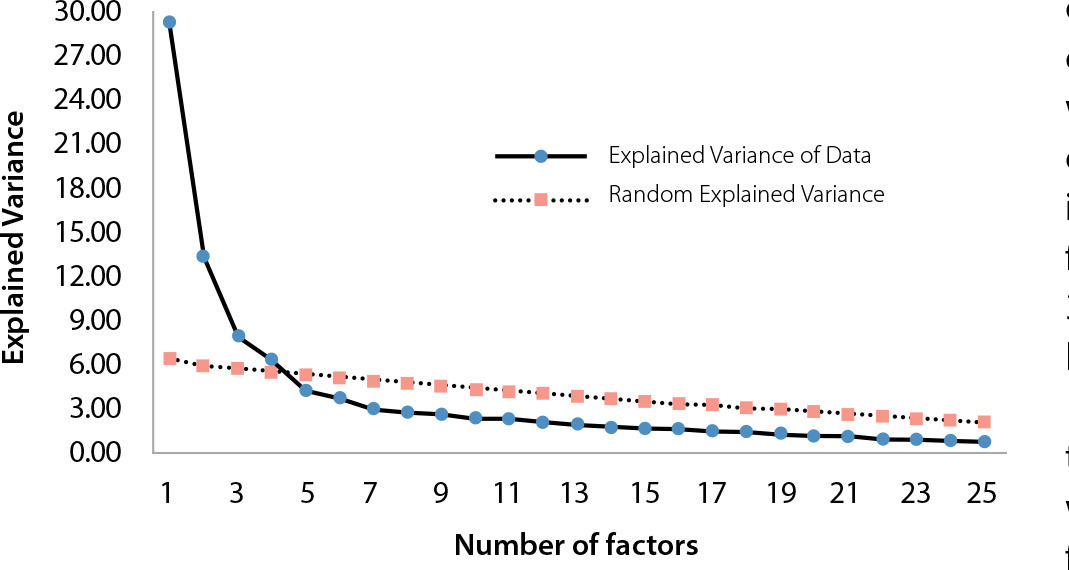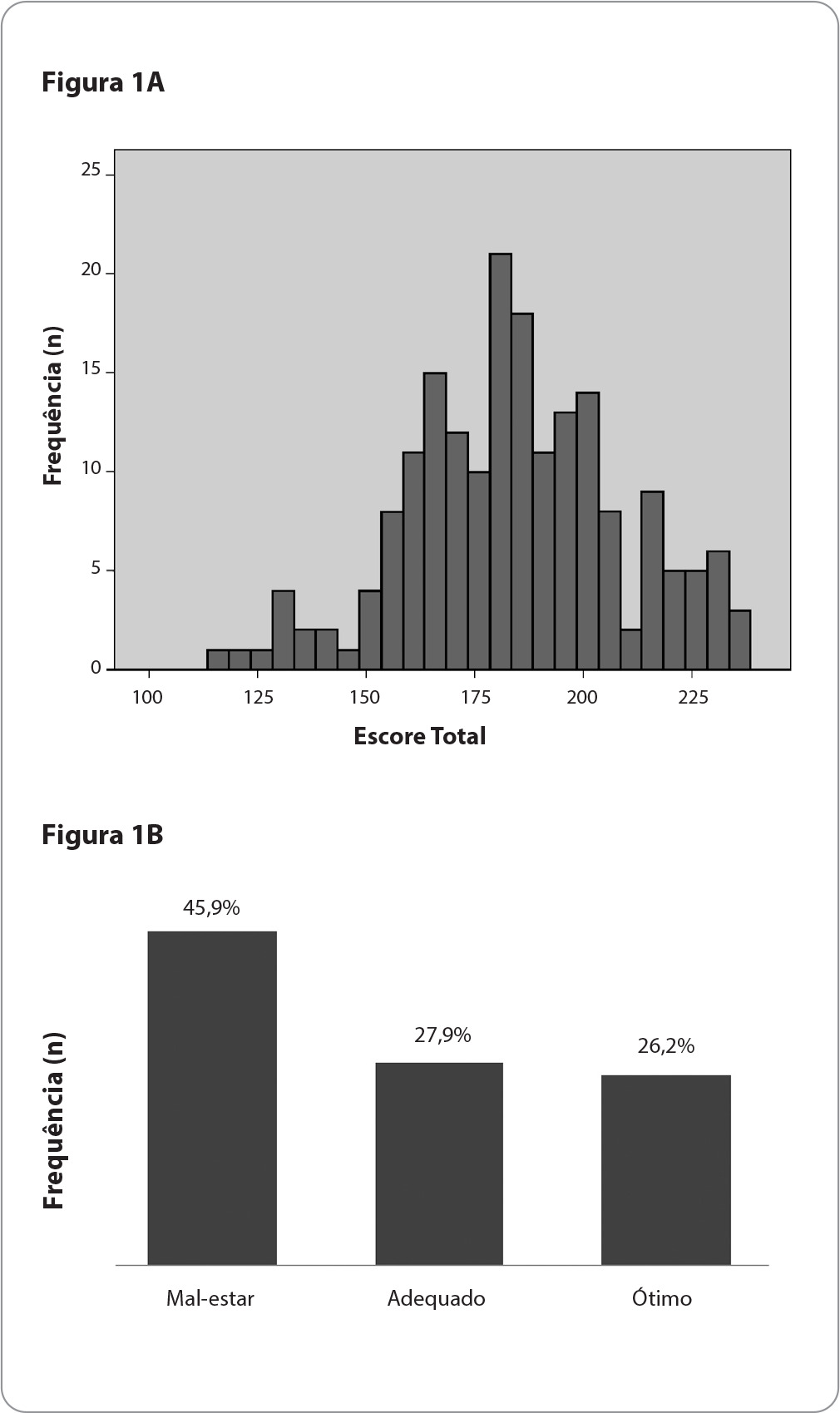-
ORIGINAL ARTICLE
Evidence of validity of the Risk Self-Medication Questionnaire focused on Health Literacy
Revista Brasileira de Enfermagem. 2024;77(3):e20230386
29/07/2024
Resumo
ORIGINAL ARTICLEEvidence of validity of the Risk Self-Medication Questionnaire focused on Health Literacy
Revista Brasileira de Enfermagem. 2024;77(3):e20230386
29/07/2024DOI 10.1590/0034-7167-2023-0386
Visualizações0Ver maisABSTRACT
Objectives:
to analyze the validity evidence of the internal structure of the Risk Self-Medication Questionnaire Focused on Health Literacy.
Methods:
a psychometric study with 499 adults. The internal structure was assessed with exploratory and confirmatory factor analysis to prove the adjustment. Internal consistency was measured by composite reliability and McDonald’s omega coefficient (ω).
Results:
the parameters revealed a model of 35 items distributed across four factors, explaining 56% of the total variance, with factor loadings ranging from 0.31 to 0.85 and adequate communalities. Accuracy (0.79
Conclusions:
an instrument was obtained with good evidence of structural validity for measuring self-medication.

-
ORIGINAL ARTICLE
Nurses’ perspectives on nurses’ work methods
Revista Brasileira de Enfermagem. 2024;77(3):e20230374
29/07/2024
Resumo
ORIGINAL ARTICLENurses’ perspectives on nurses’ work methods
Revista Brasileira de Enfermagem. 2024;77(3):e20230374
29/07/2024DOI 10.1590/0034-7167-2023-0374
Visualizações0Ver maisABSTRACT
Objectives:
To analyze nurses’ perspectives on nurses’ work methods in the hospital context.
Methods:
A descriptive study with a qualitative approach was conducted in a hospital in northern Portugal, involving 17 nurses. Semi-structured interviews were used for data collection. Data collected between May and June 2023 underwent content analysis, supported by Atlas.ti software.
Results:
Three thematic areas emerged: “Nurses’ work methods in a hospital context,” highlighting the conception and components of work methods and the methods in use; “Implementation of nurses’ work methods,” emphasizing influencing factors and challenges to implementation; and “Impact of nurses’ work methods on patients, nurses, and institutions.”
Final Considerations:
Nurses’ work methods constitute the structure of nursing care. Some factors influence and some challenges arise in the implementation of these methods, producing impacts on patients, nurses, and institutions.

-
ORIGINAL ARTICLE
Validation of the Brazilian Version of the Modified Scale for Delineating Advanced Practice Nursing Roles
Revista Brasileira de Enfermagem. 2024;77(2):e20230211
19/07/2024
Resumo
ORIGINAL ARTICLEValidation of the Brazilian Version of the Modified Scale for Delineating Advanced Practice Nursing Roles
Revista Brasileira de Enfermagem. 2024;77(2):e20230211
19/07/2024DOI 10.1590/0034-7167-2023-0211
Visualizações0ABSTRACT
Objectives:
to validate the Brazilian version of the Modified Scale for Delineating Advanced Practice Nursing Roles.
Methods:
this was a methodological study for the clinical validation of an instrument, conducted with 207 nurses working in primary care. Exploratory and confirmatory factor analysis, Cronbach’s alpha test, and z-test for proportion comparison were used.
Results:
the internal reliability of the scale was 0.944, with alpha greater than 0.80 in most domains, except for Education (0.786). In the exploratory factor analysis, considering the criterion of eigenvalue greater than one, eight factors were identified, explaining 79.38% of the variance. In the comparison of proportions, the adequate responses (≥ 2) in the domain of Comprehensive Direct Care, in both analyzed groups, were statistically equal. This domain had the highest score of adequate responses, followed by Education and Systems Support. Insufficient scoring was observed in the domains of Publication and Professional Leadership.
Conclusions:
the instrument demonstrated stability and reliability to be used in the evaluation of advanced nursing practice.
Palavras-chave: Advanced Practice NursingNursingPrimary Health CarePublic Health NursingValidation StudiesVer mais
-
ORIGINAL ARTICLE
Validation of an instrument for patient classification to support obstetric nursing care
Revista Brasileira de Enfermagem. 2024;77(2):e20230401
19/07/2024
Resumo
ORIGINAL ARTICLEValidation of an instrument for patient classification to support obstetric nursing care
Revista Brasileira de Enfermagem. 2024;77(2):e20230401
19/07/2024DOI 10.1590/0034-7167-2023-0401
Visualizações0ABSTRACT
Objectives:
to develop and validate an instrument for the classification of pregnant and postpartum women according to the demand for nursing care.
Methods:
a methodological study conducted in three stages: 1) construction of the instrument based on literature review; 2) content validation using the Delphi technique with 12 experts; and 3) Evaluation of the convergent construct validity through the correlation between the scores of the constructed instrument and the Fugulin instrument.
Results:
an instrument with ten indicators of specific care for pregnant and postpartum women was developed. A content validity index higher than 0.9 was obtained, requiring only one round of the Delphi technique. The Spearman coefficient was 0.64 between the instruments, indicating a strong correlation.
Conclusions:
the classification instrument specifically constructed for pregnant and postpartum women showed evidence of content validity and convergent construct validity with a widely used instrument in the national territory.
Palavras-chave: Hospital AdministrationNursing AssessmentObstetric NursingPersonnel ManagementValidation StudyVer mais -
ORIGINAL ARTICLE
Nursing students’ perception: Escape Room use in teaching leadership skills
Revista Brasileira de Enfermagem. 2024;77(2):e20230414
19/07/2024
Resumo
ORIGINAL ARTICLENursing students’ perception: Escape Room use in teaching leadership skills
Revista Brasileira de Enfermagem. 2024;77(2):e20230414
19/07/2024DOI 10.1590/0034-7167-2023-0414
Visualizações0Ver maisABSTRACT
Objectives:
to understand nursing students’ perception regarding Escape Room use to develop leadership skills.
Methods:
a qualitative exploratory-descriptive study, with 97 nursing students. Escape Room game sessions were held, totaling ten. Subsequently, a debriefing and analysis was carried out using the Discourse of the Collective Subject method, through the focus group technique. Ethical procedures were respected.
Results:
students’ perceptions about using this methodology to develop leadership skills were positive and significant. The effectiveness of the game in teaching and developing these skills in nursing practice stands out.
Final Considerations:
the game was an effective active methodology in approaching the proposed content, promoting satisfaction and easy assimilation.
-
ORIGINAL ARTICLE
The use of spirituality/religiosity by oncology nurse residents in nursing care
Revista Brasileira de Enfermagem. 2024;77(2):e20230383
19/07/2024
Resumo
ORIGINAL ARTICLEThe use of spirituality/religiosity by oncology nurse residents in nursing care
Revista Brasileira de Enfermagem. 2024;77(2):e20230383
19/07/2024DOI 10.1590/0034-7167-2023-0383
Visualizações0Ver maisABSTRACT
Objectives:
to analyze the use of spirituality/religiosity by oncology nurse residents in caring for patients with cancer.
Methods:
a census, descriptive, sectional study, with 46 nurse residents from three public hospitals in Rio de Janeiro. Data collection took place between August 2020 and January 2021, using a sociodemographic questionnaire, including a question about the use of spirituality/ religiosity to deal with work situations. Descriptive analysis was carried out using SPSS software version 22.0.
Results:
participants stated that they use religiosity/spirituality in work situations related to patients or themselves. In relation to patients, death was the most mentioned situation among professionals, and for themselves, everyday situations and emotional vulnerability were the most mentioned.
Final Considerations:
spirituality and religiosity are dimensions that guide oncology nurse residents’ attitudes.
-
Drug-resistant tuberculosis: integrative review of nursing care in primary health care
Revista Brasileira de Enfermagem. 2024;77(2):e20230097
19/07/2024
Resumo
Drug-resistant tuberculosis: integrative review of nursing care in primary health care
Revista Brasileira de Enfermagem. 2024;77(2):e20230097
19/07/2024DOI 10.1590/0034-7167-2023-0097
Visualizações0Ver maisABSTRACT
Objectives:
to identify, in the scientific literature, the care that should be provided to individuals with drug-resistant tuberculosis by nurses in primary health care.
Methods:
integrative review, using the Preferred Reporting Items for Systematic Reviews and Meta-Analyses study selection flowchart. Data collection was conducted in November 2022, across ten databases.
Results:
six studies emphasized that nurses should perform directly observed treatment; two highlighted the importance of integrated care management between tuberculosis and human immunodeficiency virus; two demonstrated comprehensive nursing consultation using the nursing process; one emphasized person-centered care, with discharge planning and improved hospital communication with primary health care services.
Final Considerations:
the care that nurses should provide to individuals with drug-resistant tuberculosis in primary health care, for care resolution, is evidence-based.

-
ORIGINAL ARTICLE
Fatores associados ao bem-estar materno em situação de parto de puérperas em Minas Gerais
Revista Brasileira de Enfermagem. 2024;77(6):e20230304
16/12/2024
Resumo
ORIGINAL ARTICLEFatores associados ao bem-estar materno em situação de parto de puérperas em Minas Gerais
Revista Brasileira de Enfermagem. 2024;77(6):e20230304
16/12/2024DOI 10.1590/0034-7167-2023-0304pt
Visualizações1RESUMO
Objetivos:
analisar os fatores associados ao bem-estar materno em situação de parto de puérperas em Minas Gerais.
Métodos:
estudo transversal, aninhado a uma coorte, realizado com puérperas em um município mineiro. Foi adotada a escala Bem-Estar Materno em Situação de Parto 2. Estimaram-se as prevalências do bem-estar materno em situação de parto. A magnitude da associação entre mal-estar materno e práticas assistenciais foi estimada pela Razão de Prevalência (RP), utilizando-se a regressão de Poisson.
Resultados:
participaram 183 puérperas com idade entre 15 e 46 anos, sendo que 26,2%, 27,9% e 45,9% relataram, respectivamente, ótimo, adequado e mal-estar na assistência ao parto. O mal-estar materno foi mais prevalente entre puérperas que passaram por parto cesárea (RP = 1,60) e que não receberam informações sobre amamentação (RP = 1,59).
Conclusões:
observou-se elevada prevalência de mal-estar no parto, associada à realização de cesáreas e à falta de informações sobre amamentação.
Palavras-chave: Assistência ao PartoBem-Estar MaternoHumanização da AssistênciaParto ObstétricoPeríodo Pós-PartoVer mais
-
ORIGINAL ARTICLE
The nursing practice environment and hospital sociotechnical complexity: a mixed-methods study
Revista Brasileira de Enfermagem. 2024;77(6):e20230315
16/12/2024
Resumo
ORIGINAL ARTICLEThe nursing practice environment and hospital sociotechnical complexity: a mixed-methods study
Revista Brasileira de Enfermagem. 2024;77(6):e20230315
16/12/2024DOI 10.1590/0034-7167-2023-0315
Visualizações1ABSTRACT
Objectives:
to analyze the relationship between the nursing practice environment and hospital sociotechnical complexity as perceived by nurses.
Methods:
a sequential explanatory mixed-methods study was conducted in a hospital in southern Brazil. The Brazilian version of the Practice Environment Scale-Nursing Work Index and the Complexity Characterization Questionnaire were administered to 132 nurses. Subsequently, semi-structured interviews were conducted with 18 participants, and the data were subjected to thematic analysis. Data integration was achieved through a connection approach.
Results:
the nursing practice environment was found to be favorable, except in the subscale concerning Staffing and Resource Adequacy, where complexity was present in the activities. The three emerging categories explained human and technical aspects related to complexity in the practice environment, quality of care, and patient safety. Unexpected variability was inversely correlated with the practice environment.
Conclusions:
the study results indicate a relationship between these constructs, with implications for the quality and the safety of care.
Palavras-chave: Complexity AnalysisHealth Facility EnvironmentNursingPatient SafetyQuality of Health CareVer mais
-
Recommendations for guidelines for promoting mental health in the workplace: an umbrella review
Revista Brasileira de Enfermagem. 2024;77(6):e20240086
16/12/2024
Resumo
Recommendations for guidelines for promoting mental health in the workplace: an umbrella review
Revista Brasileira de Enfermagem. 2024;77(6):e20240086
16/12/2024DOI 10.1590/0034-7167-2024-0086
Visualizações1Ver maisABSTRACT
Objectives:
to summarize the recommendations of guidelines for promoting mental health in the workplace.
Methods:
an umbrella review, according to Joanna Briggs Institute and Preferred Reporting Items for Systematic reviews and Meta-Analyses methodological assumptions. Data collection was carried out in January 2021 and updated in July 2023 in the American Psychological Association, Cochrane Library, EMBASE, National Library of Medicine, and Scopus databases. Systematic reviews that assessed guidelines with recommendations for mental health care for workers were included. PROSPERO registration CRD42023461845.
Results:
four systematic reviews published between 2015 and 2018 were identified. The abstracts highlighted actions that facilitate and inhibit the recommendations as well as three categories of intervention: primary prevention – worker protection; secondary prevention – promoting workers’ mental health; and tertiary prevention – supporting, monitoring and rehabilitating workers upon returning to work.
Conclusions:
the interventions are based on prevention, promotion and early recognition, support and rehabilitation of mental health problems.

Búsqueda
Buscar en:
Nuvem de Tags
Adolescente (85) Atenção Primária à Saúde (239) COVID-19 (91) Criança (91) Cuidados de Enfermagem (269) Educação em Enfermagem (151) Educação em Saúde (139) Enfermagem (930) Enfermagem Pediátrica (86) Estudantes de Enfermagem (77) Estudos de Validação (131) Família (87) Idoso (208) Promoção da Saúde (99) Qualidade de Vida (104) Saúde do Trabalhador (86) Saúde Mental (145) Saúde Pública (82) Segurança do Paciente (150) Tecnologia Educacional (100)




